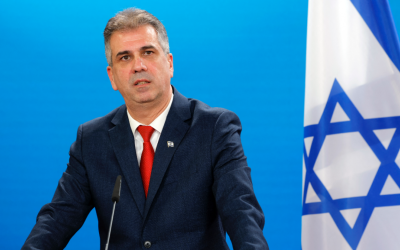Israel judicial crisis: Mass protests sweep country against bill curtailing court oversight

Mass protests against the Israeli government's judicial reforms swept Israel on Tuesday, with highways leading to Jerusalem, Haifa and Tel Aviv blocked by protesters on a “day of disruption”, as organisers billed it.
Demonstrators rallied against the Israeli parliament proceeding with a key part of the government's judicial overhaul programme, which aims to radically constrain the independence and powers of the judiciary.
Prime Minister Benjamin Netanyahu has vowed to press ahead with the legislation, which critics say would politicise the judiciary despite widespread opposition.
Israeli police announced that at least 66 protesters across the country were arrested on suspicion of “disturbing public order”.
The latest bill, which needs another two readings to become law, would see the abolition of the “reasonableness standard”, eliminating the Supreme Court's ability to block government decisions it deems unreasonable.
Police used water cannons to clear protesters blocking a main highway leading into Jerusalem. In Haifa, demonstrators blocked a major highway, unfurling a large banner reading “together we will be victorious”.
Grace, who moved from Britain several years ago to live in Israel, had joined the protests against the judicial overhaul and spoke to Middle East Eye about why she was taking part.
"Israel is deteriorating towards complete dictatorship and corruption, and we are trying to stop it. Whatever laws this government doesn't like, it cancels, so all the power goes into government hands and away from the public," she said.
'Israel is deteriorating towards complete dictatorship and corruption, and we are trying to stop it'
- Grace, Anglo-Israeli protester
"The message we have for the government is [that] no one here will agree to live in a dictatorship. We are seeing an extreme government that wants to create an extreme country, and we don't want that to happen. We are going to show them that the power of the people is stronger than that of the people in power," she added.
In Tel Aviv's Ben-Gurion aiport, the country's main gateway to the world, thousands of peaceful demonstrators gathered despite police warnings that they would not be allowed to congregate at the main terminal.
Opposition leader and former minister of defense, Benny Gantz, spoke in Tel Aviv in support of the ongoing protests.
“They are worried for the country and in light of this concern, they are here leading this fight,” Gantz said of the demonstrators. “I call on them to continue in this direction… ultimately the protests will block this judicial coup.”
About 300 Israeli army reservists who serve as cyber specialists announced that they will stop reporting for duty following Monday's vote in parliament.
"We will not continue to develop cyber capabilities for a criminal regime, and we will not train the future generation of [Israel's] offensive cyber," they said in a statement.
"Axing the reasonableness standard will create a culture of corrupt appointments that will lead to the destruction of state institutions, including its security agencies," they added, stressing that "Our work cannot continue under such a severe legal and moral cloud."
Protests have swept Israel for the last six months, as hundreds of thousands of demonstrators have railed against Netanyahu's plans, denouncing them as a coup.
The political crisis has pitted Netanyahu’s far-right government against the country’s civil society, academic and business elite, as well as former government ministers and military figures.
The American Jewish Committee, a powerful advocacy group in the US, expressed concern following the passing of the latest piece of legislation and said it supported efforts to find a compromise and include opposition voices.
A protest in Tel Aviv on Saturday, one of a series of weekly demonstrations, gathered an estimated 150,000 people.
No going back
The government argues that judicial reform, which would give politicians more power over the courts, is necessary to ensure a better balance of power.
In March, Netanyahu announced a "pause" to allow for talks on the reforms, which were moving through parliament and split the nation.
After unsuccessful talks with the opposition following weeks of mass protests earlier this year, the government is on the offensive once again this week.
Netanyahu is on trial for corruption, and the judicial reforms could enable him to evade conviction or see his case dismissed. Since being indicted in 2019, Netanyahu has publicly railed against the justice system, calling it biased against him.
Israel has no constitution and there is little separation between the executive and legislative branches, as governments nearly always hold a majority in parliament, the Knesset.
This has historically meant the Supreme Court is the most effective check on government power.
In January, dozens of prominent American legal scholars from several leading law schools signed a public statement voicing deep concerns about the proposed changes to Israel's judicial system.
In the statement, more than 70 US law professors said the proposed reforms "will seriously weaken the independence of the judiciary, the separation of powers, and the rule of law in Israel".
Middle East Eye propose une couverture et une analyse indépendantes et incomparables du Moyen-Orient, de l’Afrique du Nord et d’autres régions du monde. Pour en savoir plus sur la reprise de ce contenu et les frais qui s’appliquent, veuillez remplir ce formulaire [en anglais]. Pour en savoir plus sur MEE, cliquez ici [en anglais].





